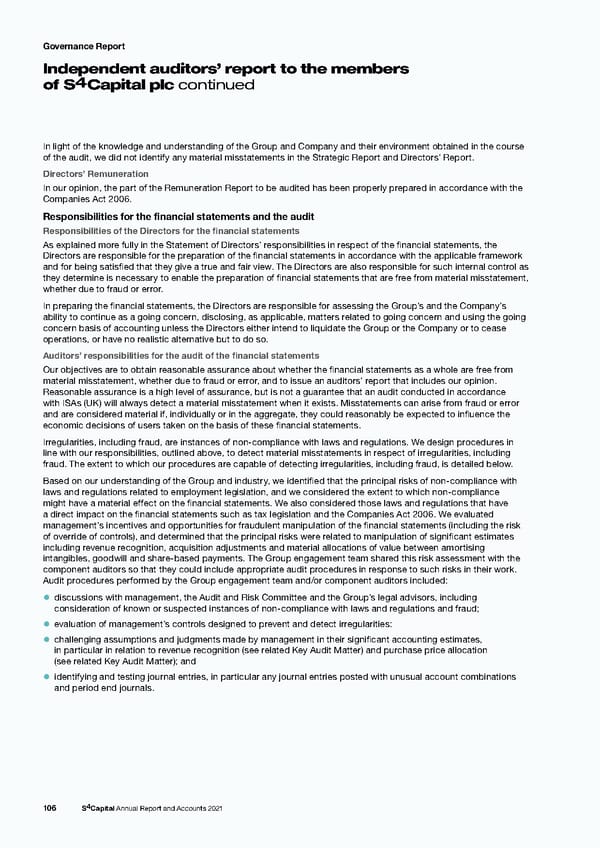Governance Report Independent auditors’ report to the members 4 of S Capital plc continued In light of the knowledge and understanding of the Group and Company and their environment obtained in the course of the audit, we did not identify any material misstatements in the Strategic Report and Directors’ Report. Directors’ Remuneration In our opinion, the part of the Remuneration Report to be audited has been properly prepared in accordance with the Companies Act 2006. Responsibilities for the financial statements and the audit Responsibilities of the Directors for the financial statements As explained more fully in the Statement of Directors’ responsibilities in respect of the financial statements, the Directors are responsible for the preparation of the financial statements in accordance with the applicable framework and for being satisfied that they give a true and fair view. The Directors are also responsible for such internal control as they determine is necessary to enable the preparation of financial statements that are free from material misstatement, whether due to fraud or error. In preparing the financial statements, the Directors are responsible for assessing the Group’s and the Company’s ability to continue as a going concern, disclosing, as applicable, matters related to going concern and using the going concern basis of accounting unless the Directors either intend to liquidate the Group or the Company or to cease operations, or have no realistic alternative but to do so. Auditors’ responsibilities for the audit of the financial statements Our objectives are to obtain reasonable assurance about whether the financial statements as a whole are free from material misstatement, whether due to fraud or error, and to issue an auditors’ report that includes our opinion. Reasonable assurance is a high level of assurance, but is not a guarantee that an audit conducted in accordance with ISAs (UK) will always detect a material misstatement when it exists. Misstatements can arise from fraud or error and are considered material if, individually or in the aggregate, they could reasonably be expected to influence the economic decisions of users taken on the basis of these financial statements. Irregularities, including fraud, are instances of non-compliance with laws and regulations. We design procedures in line with our responsibilities, outlined above, to detect material misstatements in respect of irregularities, including fraud. The extent to which our procedures are capable of detecting irregularities, including fraud, is detailed below. Based on our understanding of the Group and industry, we identified that the principal risks of non-compliance with laws and regulations related to employment legislation, and we considered the extent to which non-compliance might have a material effect on the financial statements. We also considered those laws and regulations that have a direct impact on the financial statements such as tax legislation and the Companies Act 2006. We evaluated management’s incentives and opportunities for fraudulent manipulation of the financial statements (including the risk of override of controls), and determined that the principal risks were related to manipulation of significant estimates including revenue recognition, acquisition adjustments and material allocations of value between amortising intangibles, goodwill and share-based payments. The Group engagement team shared this risk assessment with the component auditors so that they could include appropriate audit procedures in response to such risks in their work. Audit procedures performed by the Group engagement team and/or component auditors included: • discussions with management, the Audit and Risk Committee and the Group’s legal advisors, including consideration of known or suspected instances of non-compliance with laws and regulations and fraud; • evaluation of management’s controls designed to prevent and detect irregularities: • challenging assumptions and judgments made by management in their significant accounting estimates, in particular in relation to revenue recognition (see related Key Audit Matter) and purchase price allocation (see related Key Audit Matter); and • identifying and testing journal entries, in particular any journal entries posted with unusual account combinations and period end journals. 106 S4Capital Annual Report and Accounts 2021
 s4 capital annual report and accounts 2021 Page 107 Page 109
s4 capital annual report and accounts 2021 Page 107 Page 109